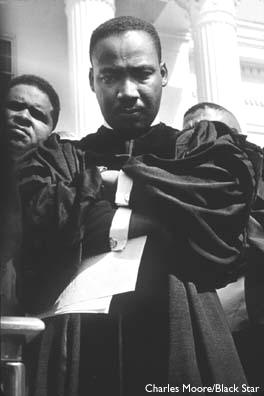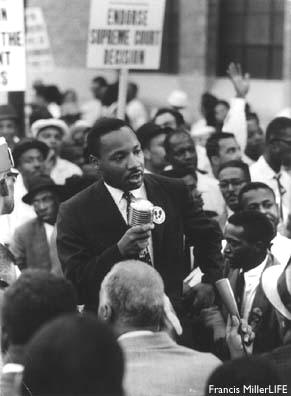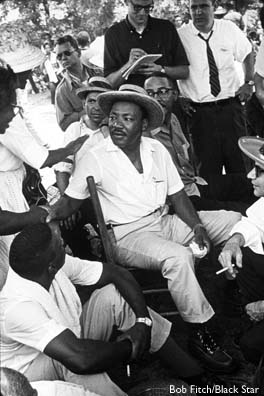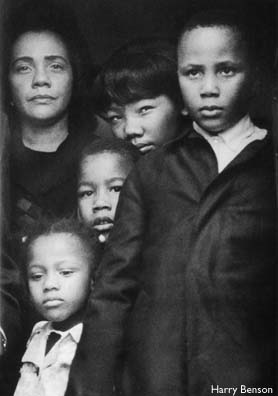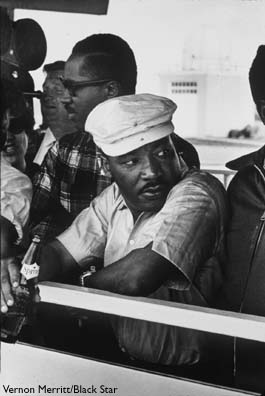Course home page
Assignment
Why
is Reverend Dr. Martin Luther King, Jr. considered the most
notable figure in the American civil rights movement?
Background
Michael Luther
King, Jr. was born on January 15, 1928 in Atlanta, Georgia. He
was the second child born to the union of Michael Luther King,
Sr. and Alberta King. His father later changed both his own and
his son’s first name to Martin, in order that they resembled that of the
sixteenth-century religious reformer Martin
Luther.
Martin Luther
King had a strong desire to be an educated man. He excelled in
nearly every educational setting afforded to him. He skipped two
grades in high school and was admitted to Morehouse College at
the age of 15. After receiving a Bachelor of Arts degree in
Sociology from Morehouse, he followed his ministerial calling and
entered Crozer Theological Seminary. Three years later, he
received a Bachelor of Divinity degree. With a fellowship
awarded from Crozer, Martin continued his quest for higher
education at Boston University and received a Doctorate of
Philosophy in Systematic Theology. In the years to follow, Martin
received a host of honorary degrees in law, divinity, and
humanities from educational institutions throughout the
world.
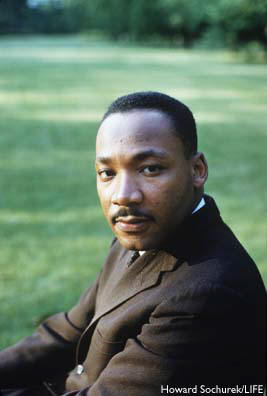 Martin’s willingness to excel and change unjust activities
may be attributed to his strong Christian background. He was
engulfed in deep-rooted faith, as both his father and maternal
grandfather were Baptist ministers who shared a congregation at
the Ebenezer Baptist Church in Atlanta, Georgia. Shortly before
he graduated from Morehouse College, he too was ordained at the
age of 19 as Baptist minister by his father and assisted in
leading the congregation at Ebenezer. He later became the pastor
at a church in Montgomery, Alabama and then moved to back to
Atlanta, again to join the Ebenezer congregation. While in Atlanta,
he became a founder of what would become one of the integral
organizations of the Civil Rights Movement – the Southern
Christian Leadership Conference (SCLC). Founders of the SCLC had
two great things in common; they were all southern black
ministers who had suffered the humility of unequal civil
rights.
Martin’s willingness to excel and change unjust activities
may be attributed to his strong Christian background. He was
engulfed in deep-rooted faith, as both his father and maternal
grandfather were Baptist ministers who shared a congregation at
the Ebenezer Baptist Church in Atlanta, Georgia. Shortly before
he graduated from Morehouse College, he too was ordained at the
age of 19 as Baptist minister by his father and assisted in
leading the congregation at Ebenezer. He later became the pastor
at a church in Montgomery, Alabama and then moved to back to
Atlanta, again to join the Ebenezer congregation. While in Atlanta,
he became a founder of what would become one of the integral
organizations of the Civil Rights Movement – the Southern
Christian Leadership Conference (SCLC). Founders of the SCLC had
two great things in common; they were all southern black
ministers who had suffered the humility of unequal civil
rights.
Because of
institutional segregation Dr. King was introduced to the
inequalities of race at an early age. As a child, his best
friend was a white boy. He and the boy were allowed to play
together but were not permitted to attend the same school. Martin did not
quite understand why others did not practice his
parents’ golden rule of "treating EVERYONE EQUAL and
with respect."
Throughout the
years to follow, Martin encountered more situations of inequality
such as those associated with public use facilities,
transportation, and voting. Dr. King felt something needed to be
done, but he insisted it had to in a rational manner and without
violence. He embraced the principles of Mahatma Gandhi, who
believed those in power could be forced to change through
“peaceful revolution” and the ideas of Henry David
Thoreau, who believed “if enough people would follow their
conscience and disobey unjust laws, they could bring about a
peaceful revolution.” Armed with such philosophies, King
headed the Montgomery Improvement Association (MIA) and lead one
of the first mass civil rights protests. The year long
Montgomery Bus Boycott was the first action taken to desegregate
the Montgomery, Alabama public bus system. He later recounted the
events of this protest in a book, Strive Toward Freedom
(1958). King and the SCLC lead many more boycotts, sit-ins and
protests throughout the southern United States in an attempt to
peacefully demand equal civil rights, and social and economic
justice, not only for just African Americans, but all minorities
and disadvantaged Americans.
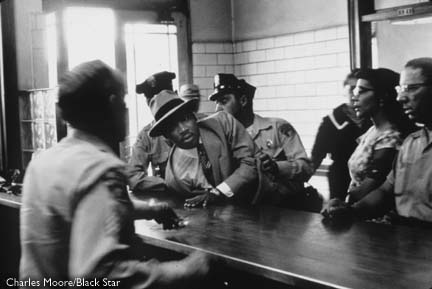 King faced many obstacles while on his mission for equality. He
was arrested over twenty times for protesting. He was the object
of several violent attacks, both to his person and his
property. He received threatening phone calls, his home was
bombed and set afire, and he was even stabbed. King faced
opposition from not only whites and their leaders but also from some
of his own race. The Student Nonviolent Coordinating Committee
(SNCC) was a diverse group of students who desired social
change. Initially, King supported the efforts of the SNCC, but
soon conflict surfaced. Dr. King wanted to be patient and
continue to work non-violently toward equality. The SNCC became
militant, and wanted immediate action taken on its issues and
did not desire to wait for changes. Because of such philosophical
differeces, the
two forces soon grew apart. Martin also faced obstacles that
were initiated by the federal government. He was subjected to several unwarranted
investigations by the Federal Bureau of Investigation and undue
harassment by its head, J. Edgar Hoover. Hoover felt King caused
too much ‘trouble’ and called him "the most notorious
liar in the country." Hoover thought if there was negative
publicity questioning King's morality, perhaps his followers may
not be as supportive. Fortunately, Hoover and his attempts to
discredit Dr. King did not hinder King’s efforts toward
securing equal rights for all.
King faced many obstacles while on his mission for equality. He
was arrested over twenty times for protesting. He was the object
of several violent attacks, both to his person and his
property. He received threatening phone calls, his home was
bombed and set afire, and he was even stabbed. King faced
opposition from not only whites and their leaders but also from some
of his own race. The Student Nonviolent Coordinating Committee
(SNCC) was a diverse group of students who desired social
change. Initially, King supported the efforts of the SNCC, but
soon conflict surfaced. Dr. King wanted to be patient and
continue to work non-violently toward equality. The SNCC became
militant, and wanted immediate action taken on its issues and
did not desire to wait for changes. Because of such philosophical
differeces, the
two forces soon grew apart. Martin also faced obstacles that
were initiated by the federal government. He was subjected to several unwarranted
investigations by the Federal Bureau of Investigation and undue
harassment by its head, J. Edgar Hoover. Hoover felt King caused
too much ‘trouble’ and called him "the most notorious
liar in the country." Hoover thought if there was negative
publicity questioning King's morality, perhaps his followers may
not be as supportive. Fortunately, Hoover and his attempts to
discredit Dr. King did not hinder King’s efforts toward
securing equal rights for all.
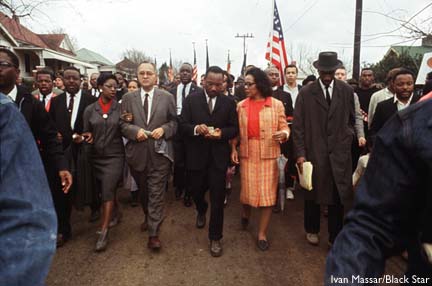
The Selma to
Montgomery March, publicized by King, proved to be a turning
point in the Civil Rights Movement. The violent events that took
place during the march prompted President Lyndon B. Johnson to
force passage of the Voting Rights
Act of 1965; after which matters involving race relations
began to change. Attitudes toward racial equality did not
totally change with the Act, but it was definitely a start. Despite the Act
being a turning point, there was still more work
to be done. Unfortunately, Dr. King did not live to continue his
hard work and dedication nor see it come to fruition. While in
Memphis, Tennessee in support of striking sanitation workers, he
was tragically shot and killed on the balcony of hotel room by
James Earl Ray. Compared to the death of President John F.
Kennedy, who was also a great helper to 'the people', it was a
sad day in history.
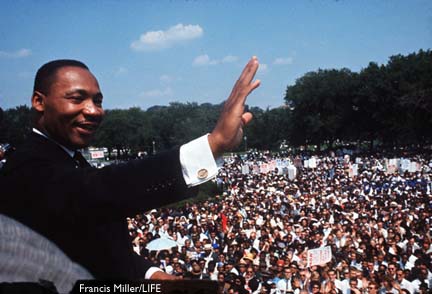 Dr. King has been credited with motivating many to the support
of the civil rights movement. His great orations, such as
I Have Dream at the March on Washington, inspired many.
When he spoke, his fervor, dedication, commitment and passion for
racial justice became contagious. Martin was
truly a driving force in minority America’s quest for
equality. He "had a dream" and a vision that one day would
everyone would be treated equal and with respect. It has become
reality.
Dr. King has been credited with motivating many to the support
of the civil rights movement. His great orations, such as
I Have Dream at the March on Washington, inspired many.
When he spoke, his fervor, dedication, commitment and passion for
racial justice became contagious. Martin was
truly a driving force in minority America’s quest for
equality. He "had a dream" and a vision that one day would
everyone would be treated equal and with respect. It has become
reality.
| "For
the hour is late. And the clock of destiny is ticking out. We
must act now before it is too late." |
|
-Martin
Luther King, Jr., 4 July 1965
|
Timeline
-
15
January 1929, Michael Luther King born in Atlanta, Georgia to
Reverend Martin Luther King, Sr. and Alberta Williams King. He
was later renamed Martin (Jr.)
-
20
September 1944, Martin entered Morehouse College at the young age
of 15
- 8
June 1948, King Martin graduated from Morehouse with a Bachelor
of Arts degree in Sociology
- 8
May 1951,King graduated from Crozer
Theological Seminary with a Bachelor of Divinity
degree
- 18
June 1953, wed by his father, King married Coretta Scott
Williams
- 31
October 1954, Reverend King became the 21st pastor of
the Dexter Avenue Baptist Church in Montgomery,
Alabama
- 5
June 1955, Dr. King received a Doctorate of Philosophy in
Systematic Theology
- 14
February 1957, Dr. King and others found the Southern Christian
Leadership Conference
- 17
September 1958, Dr. King published his first book, Strive
Toward Freedom
- November 1959, Reverend King left Dexter Avenue Baptist
Church and returned to Atlanta
-
16
April 1963, King wrote
A Letter from Birmingham Jail while
incarcerated
-
28 August 1963, Dr.
King delivered his famous I Have a Dream speech during the
March on Washington at the Lincoln Memorial in Washington,
DC
-
3 January 1964, named Time
Magazine’s Man of the Year for 1963
-
June 1964, King's
book, Why We Can’t Wait published
- 10
December 1964, King won Nobel Peace Prize
- Spring1965, Dr. King
experienced perhaps the most violent of confrontations in his
quest for civil rights in Selma, Alabama; several were killed and
many injured.
- 6
August 1965, pressured by the events in Selma, President Lyndon
B. Johnson signed the Voting Rights Act of 1965, giving African
Americans the right to vote
- January 1967, Dr. King's book, Where Do We Go From Here:
Chaos or Community published
- 4
April 1968, Dr. King assassinated in Memphis, Tennessee by James
Earl Ray
- 9
April 1968, Dr. King laid to rest at his beloved Ebenezer Baptist
Church in Atlanta, Georgia
- 10
October 1980, U.S. Department of Interior deemed the Freedom Hall
Complex of the Martin Luther King, Jr. Center for Nonviolent
Social Change, Inc. a National Historic Site
- November 1983, President Ronald Reagan signed bill creating
the third Monday of each January as Martin Luther King, Jr.
holiday
- 15
January 1986, First day MLK holiday observed
WWW
sites
The Martin Luther King, Jr. Papers Project at Stanford
University is a plethora of
information regarding the man, his efforts, struggles and
accomplishments. Full texts of his
speeches,
sermons and writings
may be found. This site also contains many links to other sites
with information about the civil rights movement.
The King Center is the
"official living memorial" dedicated to the memory of
MLK.
The Seattle
Times.com website is a great resource for general information
about Dr. King and his work.
Biography on A&E contains an extremely detailed account
of Dr. King's life.
MLK Online
contains inspiring quotes by
MLK.
Some other recommded websites:
Recommended Books
Books by Dr. King:
Some of Dr. King's perspectives on the
events that took place the civil rights movement are included in
his books: Stride Toward Freedom: The Montgomery Story
(New York: Harper and Row, 1958), Why We Can't Wait (New
York: Harper & Row, 1964), Conscience for Change
(Toronto: Canadian Broadcasting Company, 1967), The Trumpet of
Conscience (New York: Harper and Row, 1968), and
Where Do We Go from Here: Chaos or Community? (Boston:
Beacon Press, 1968).
Books about Dr. King:
Two memoirs, written by two people who knew
him best, his wife and his son: King, Coretta Scott. My Life
with Martin Luther King, Jr. (New York: Holt, Henry
& Co., 1993) and King, Dexter Scott. Growing Up King: An
Intimate Memoir. (New York: Intellectual Properties
Management in association with Warner Books, 2003).
Clayborne Carson, ed.
The Autobiography of Martin Luther King, Jr. (New
York: Warner Books, 1998).
Other books concerning
King:
The following books contain truly
inspirational speeches and sermons by Dr. King: Clayborne Carson
and Kris Shepard, eds.
A Call to Conscience: The Landmark Speeches of Martin Luther
King, Jr.
(New York: IPM/Warner Books, 2001).
Clayborne Carson and Peter Holloran,
eds. (New York: Warner Books, 1998).
Related
Events
Brown v. the Board of Education
Mahatma
Gandhi
Nelson
Mandela
|
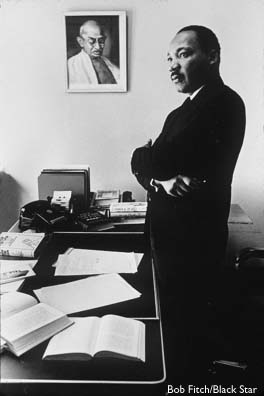
 Martin’s willingness to excel and change unjust activities
may be attributed to his strong Christian background. He was
engulfed in deep-rooted faith, as both his father and maternal
grandfather were Baptist ministers who shared a congregation at
the Ebenezer Baptist Church in Atlanta, Georgia. Shortly before
he graduated from Morehouse College, he too was ordained at the
age of 19 as Baptist minister by his father and assisted in
leading the congregation at Ebenezer. He later became the pastor
at a church in Montgomery, Alabama and then moved to back to
Atlanta, again to join the Ebenezer congregation. While in Atlanta,
he became a founder of what would become one of the integral
organizations of the Civil Rights Movement – the Southern
Christian Leadership Conference (SCLC). Founders of the SCLC had
two great things in common; they were all southern black
ministers who had suffered the humility of unequal civil
rights.
Martin’s willingness to excel and change unjust activities
may be attributed to his strong Christian background. He was
engulfed in deep-rooted faith, as both his father and maternal
grandfather were Baptist ministers who shared a congregation at
the Ebenezer Baptist Church in Atlanta, Georgia. Shortly before
he graduated from Morehouse College, he too was ordained at the
age of 19 as Baptist minister by his father and assisted in
leading the congregation at Ebenezer. He later became the pastor
at a church in Montgomery, Alabama and then moved to back to
Atlanta, again to join the Ebenezer congregation. While in Atlanta,
he became a founder of what would become one of the integral
organizations of the Civil Rights Movement – the Southern
Christian Leadership Conference (SCLC). Founders of the SCLC had
two great things in common; they were all southern black
ministers who had suffered the humility of unequal civil
rights. King faced many obstacles while on his mission for equality. He
was arrested over twenty times for protesting. He was the object
of several violent attacks, both to his person and his
property. He received threatening phone calls, his home was
bombed and set afire, and he was even stabbed. King faced
opposition from not only whites and their leaders but also from some
of his own race. The Student Nonviolent Coordinating Committee
(SNCC) was a diverse group of students who desired social
change. Initially, King supported the efforts of the SNCC, but
soon conflict surfaced. Dr. King wanted to be patient and
continue to work non-violently toward equality. The SNCC became
militant, and wanted immediate action taken on its issues and
did not desire to wait for changes. Because of such philosophical
differeces, the
two forces soon grew apart. Martin also faced obstacles that
were initiated by the federal government. He was subjected to several unwarranted
investigations by the Federal Bureau of Investigation and undue
harassment by its head, J. Edgar Hoover. Hoover felt King caused
too much ‘trouble’ and called him "the most notorious
liar in the country." Hoover thought if there was negative
publicity questioning King's morality, perhaps his followers may
not be as supportive. Fortunately, Hoover and his attempts to
discredit Dr. King did not hinder King’s efforts toward
securing equal rights for all.
King faced many obstacles while on his mission for equality. He
was arrested over twenty times for protesting. He was the object
of several violent attacks, both to his person and his
property. He received threatening phone calls, his home was
bombed and set afire, and he was even stabbed. King faced
opposition from not only whites and their leaders but also from some
of his own race. The Student Nonviolent Coordinating Committee
(SNCC) was a diverse group of students who desired social
change. Initially, King supported the efforts of the SNCC, but
soon conflict surfaced. Dr. King wanted to be patient and
continue to work non-violently toward equality. The SNCC became
militant, and wanted immediate action taken on its issues and
did not desire to wait for changes. Because of such philosophical
differeces, the
two forces soon grew apart. Martin also faced obstacles that
were initiated by the federal government. He was subjected to several unwarranted
investigations by the Federal Bureau of Investigation and undue
harassment by its head, J. Edgar Hoover. Hoover felt King caused
too much ‘trouble’ and called him "the most notorious
liar in the country." Hoover thought if there was negative
publicity questioning King's morality, perhaps his followers may
not be as supportive. Fortunately, Hoover and his attempts to
discredit Dr. King did not hinder King’s efforts toward
securing equal rights for all.
 Dr. King has been credited with motivating many to the support
of the civil rights movement. His great orations, such as
Dr. King has been credited with motivating many to the support
of the civil rights movement. His great orations, such as 